What we got wrong on our first trip to Europe
9 lessons learned about traveling when we didn't know any better
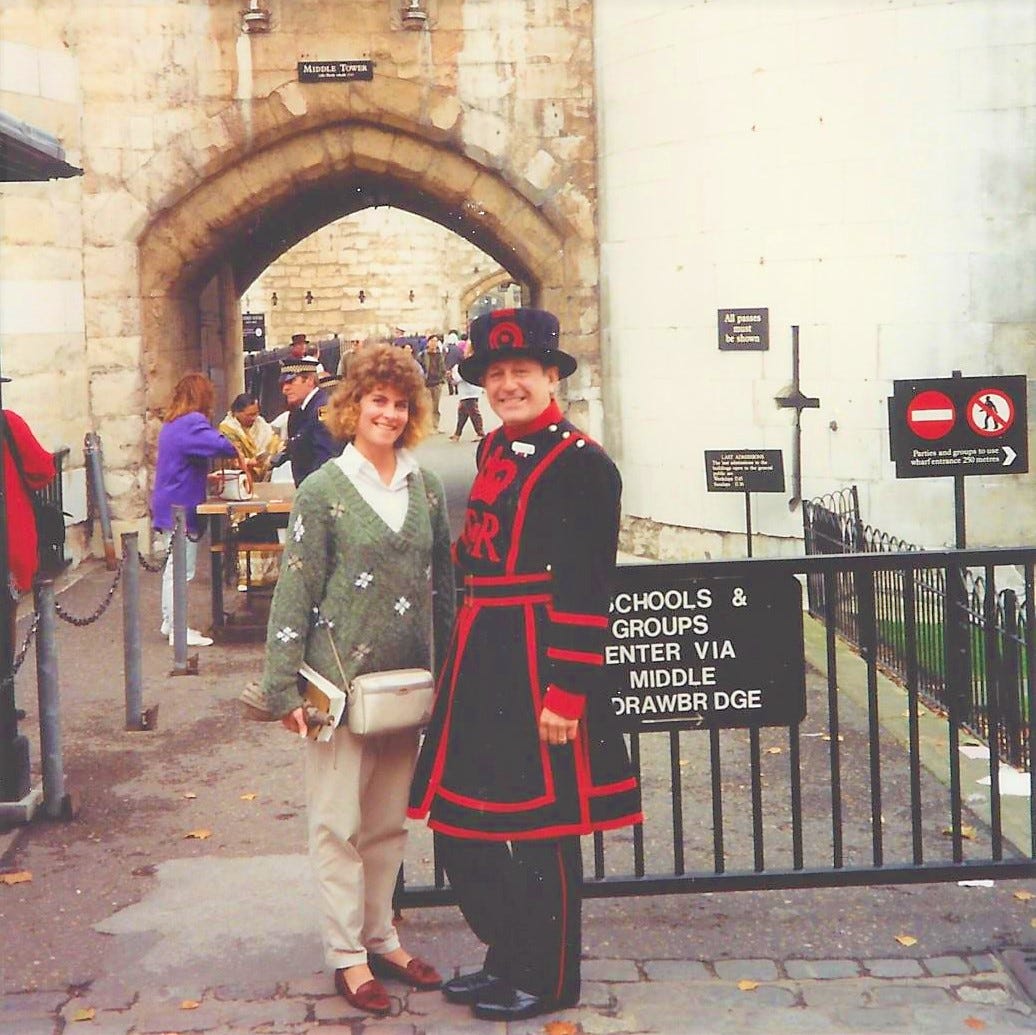
When my husband and I were 26, we decided to check the goal of going to Europe before we had kids off the bucket list. We had no interest in traveling with a tour group, but we were confident we could tackle the trip on our own.
After all, neither of us was a travel virgin–we’d been on road trips to Great American destinations with our families growing up. And the previous year, we’d done a road trip on our own through California. How hard could it be, especially if we started in a country where we spoke the language?
We wanted to cover as much ground as possible since we weren’t sure when we’d get back to Europe again. So we decided to spend a long weekend in the English countryside, followed by a few days in London and two days in Paris.
I’ve never read Innocents Abroad–Mark Twain’s humorous account of his travels with the first organized American tour of Europe in 1867. But it would be as good a title as any for our adventures.
As it turned out, navigating a 10-day trip in a foreign land for the first time on our own was trickier than we imagined it would be, even though we thought we were well-prepared. I thought I’d tell you about our mistakes and mishaps so you’ll be less likely to get tripped up (or at least won’t be surprised) when you embark on your bucket-list adventure.
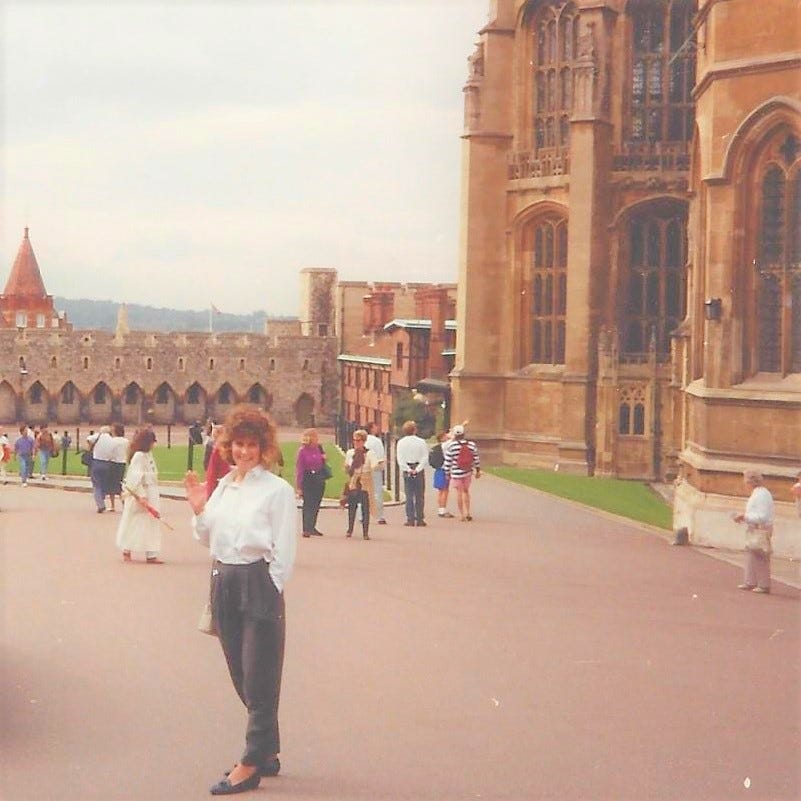
Lesson #1: Don’t try to cram too many sights into your day, especially when they aren’t in the same town
Before the trip, I studied my Fodor’s travel guidebook and tried to cherry-pick the sights we’d most like to see, which was hard to do because they had a lot of palaces, estates, and other grand sights that looked extremely interesting to old-house lovers like us.
Three days in the English countryside wasn’t much time, but as I scouted brochures from tour companies for itinerary ideas, it looked like they covered a lot of ground in a day. From what I could tell from the maps in the guidebook, England looked no bigger than the state of New Jersey, so I figured we could do likewise.
Since England is actually five times the size of New Jersey, I ended up creating our own personal edition of The Amazing Race. Our intensive road rally took us from Windsor to Salisbury, then to Stonehenge, Bath, Stratford-upon-Avon, Warwick, Woodstock, Oxford, and finally to London, all in just three days.
We did see a lot, and our enthusiasm provided the stamina we needed to power through, but we probably would have savored the experience more if we’d moved at a slower pace.
Travel guru Rick Steves says that when planning a trip, you should assume that you’ll be back again someday so you’re less tempted to try to fit everything in. He’s right.
Lesson #2: Assume there will be curveballs
My husband was game to tackle driving on the wrong side of the road. Still, we specifically requested an automatic transmission car (in Europe, 80% of vehicles have a stick shift) because he didn’t want to make it more complicated.
However, when we arrived at the rental car counter, we ended up with a stick-shift car because the company did not have automatic transmission vehicles. Luckily, my husband knew how to drive a stick shift. It wasn’t easy that first day, but my husband adapted. (If he hadn’t been able to, I suppose we would have ended up back at the rental car outlet.)
Since you can’t entirely prevent curveballs from happening when you travel, the only thing you can do is be prepared to take things in stride. Getting all worked up about changes to your plan wastes energy.
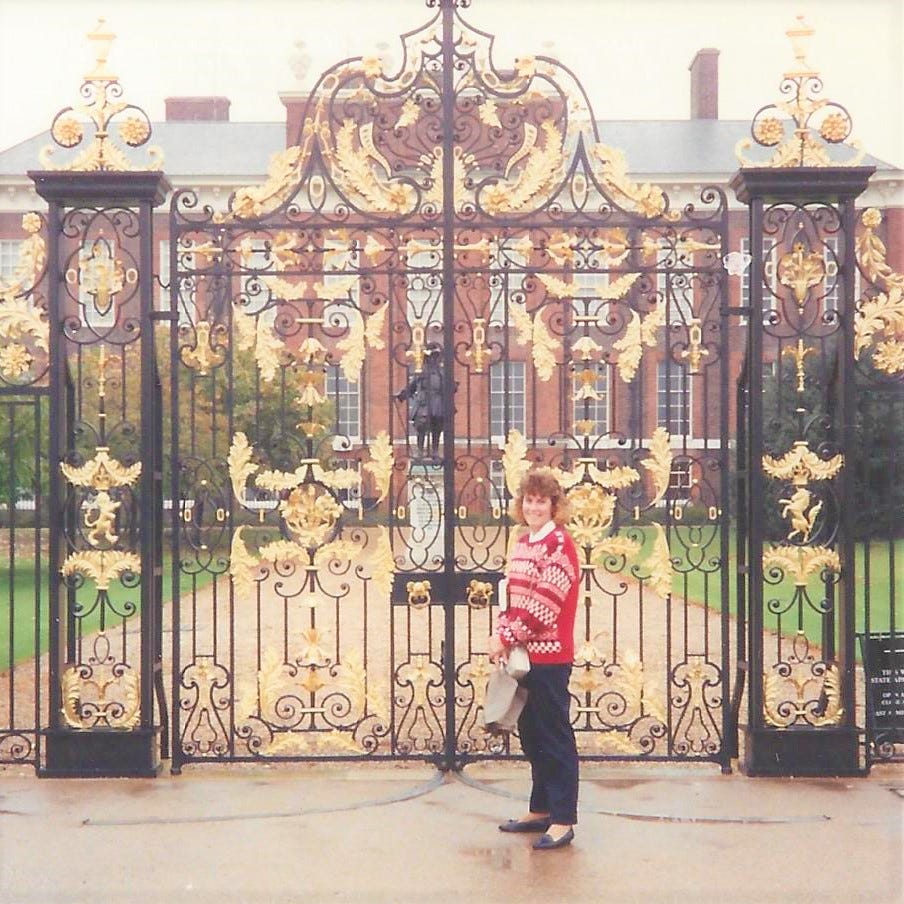
Lesson #3: Learn the basics you’ll need to be functional in the foreign land ahead of time
We’d exchanged some money into British currency at the airport but didn’t take the time to familiarize ourselves with the bills and coins we’d been handed.
When we stopped at a little refreshment stand just outside Windsor Castle, my sleep-deprived husband (we’d gotten no more than two or three hours of shut-eye on the red-eye flight) took all the coins from his pocket, struggled for several minutes to sort out the proper ones required to settle our tab, and finally surrendered the entire handful to the clerk, telling him to, “Take whatever you need.”
Luckily, we encountered one of the queen’s most honest subjects, who gave us a quick tutorial on which coin was which. He was kind, but we should have researched and been more knowledgeable when we arrived.
Knowing the coinage might seem less critical if you plan to rely mainly on a credit or debit card. Nonetheless, do your homework about how you’ll pay your way. Do you need to alert your bank that you’ll be out of the country so they don’t assume it’s fraudulent activity and decline the charges? Will your credit card charge a foreign transaction fee for every purchase you make? (Not all of them do, so it may be worth securing a credit card that doesn’t before you go).
Lesson #4: Sometimes humans provide better assistance than technology
Since we were traveling during the era before GPS, all we had was the map from the rental car company and our Fodor’s guidebook. We got lost a lot. The first day wasn’t so bad because we still had a sense of humor about it. At dusk, we were lost amid the cornfields, looking for the road to get to our little country hotel. Some affable Englishman we flagged down to ask for directions took pity on us and had us follow him to the inn.
By the second day of our cross-country race, our nerves were starting to fray. At dusk, we were lost again, having circled some little town three times, desperately looking for the grand manor house we had a reservation at that night. Eventually, a policeman helped put us right—we’d been thrown off by a typo in the directions to the hotel.
Although you’d have a better chance of making your merry way along today thanks to Waze or another GPS app guiding you, cell phone service can still be spotty, and app mishaps can occur.
Don’t be afraid to ask for an assist from your fellow man or woman. After all, you don’t visit a foreign land only to see sights; people are what make places unique. All these years later, I still remember our interactions with the Brits who came to our aid. So consider asking for help as part of your travel experience.
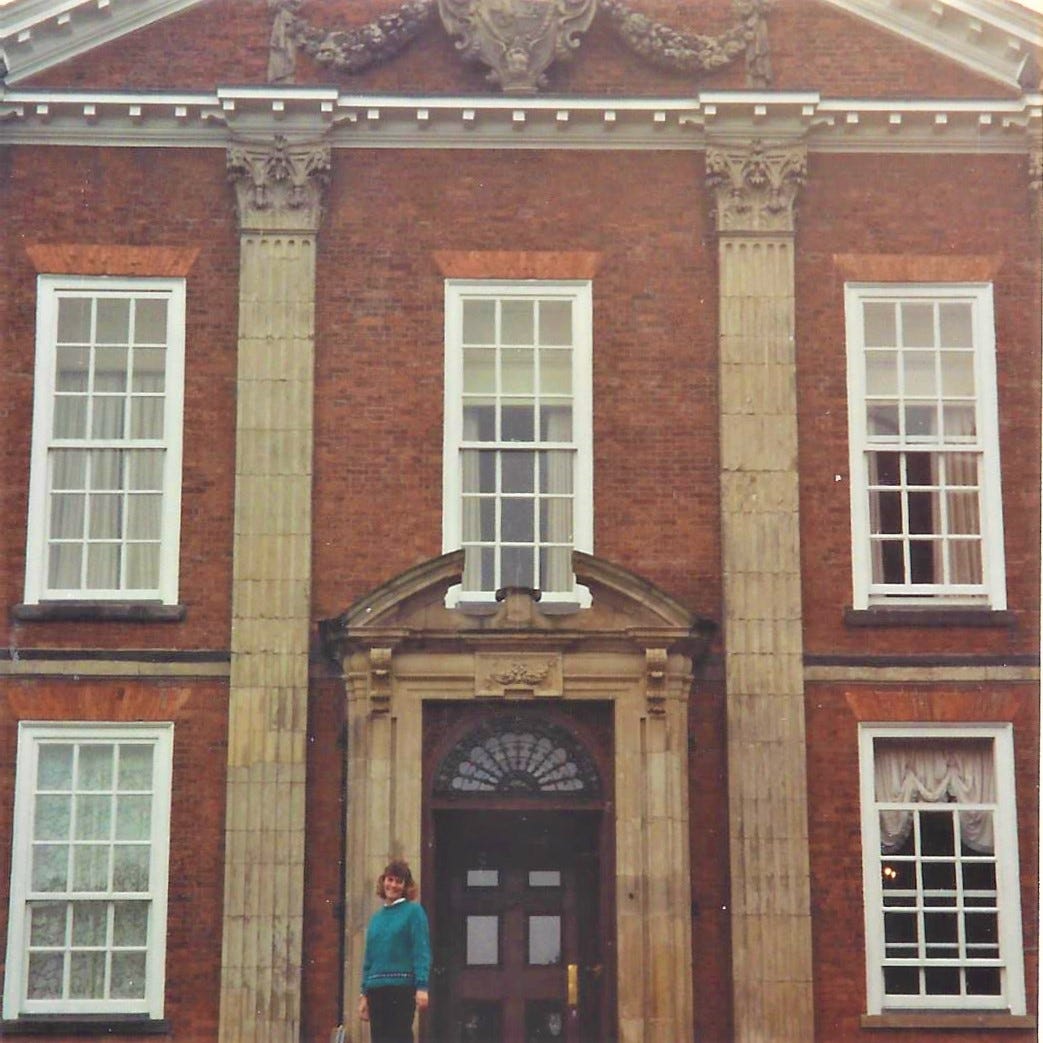
Lesson #5: Anticipate that everything from roadway conventions to the local pace of life may require adaptation on your part
We knew we’d be driving on the left side of the road instead of the right, but we had no idea how frequently roundabouts replace traffic lights at intersections in England. Navigating them was challenging until we discovered we were better off taking one trip around the roundabout to scope out our options and then exiting on our second go-round.
Although we were used to American restaurants being open late into the evening and having convenience stores at our beck and call, we discovered that hours of operation were different in England. When we finally reached the inn in the little town on our first night, we had to quickly hustle down to the local pub before it closed at 9 (!) to get something to eat.
Neither of these circumstances was a failure on England’s part; just evidence that travel broadens one’s horizons enough to see that how we do things here isn’t necessarily how they do things there. It isn’t better or worse, just different. Travel challenges you to adapt to the differences.
Lesson #6: If you have a customer service issue, always try nice first
When we arrived at Bosworth Hall, the manor house turned boutique hotel, we found that the lobby was indeed quite grand, but the room we checked into was tiny and looked nothing like the one in the brochure we’d seen.
We went back to the front desk. As I politely complained about the room not meeting our expectations, I started to cry. Besides my disappointment with the room, the stress of our packed itinerary and getting lost all the time was undoubtedly taking a toll on me. They must have felt sorry for the young American tourists because they upgraded us to a magnificent suite well beyond what we were entitled to.
The moral of the story: When you approach someone about a customer service issue, be polite and authentic. My tears were genuine and honest, and they led someone to respond with compassion and a lovely consolation prize—a night in grand accommodations. I’m still grateful that the hotel clerk turned what would have been a disappointment into a memorable experience.
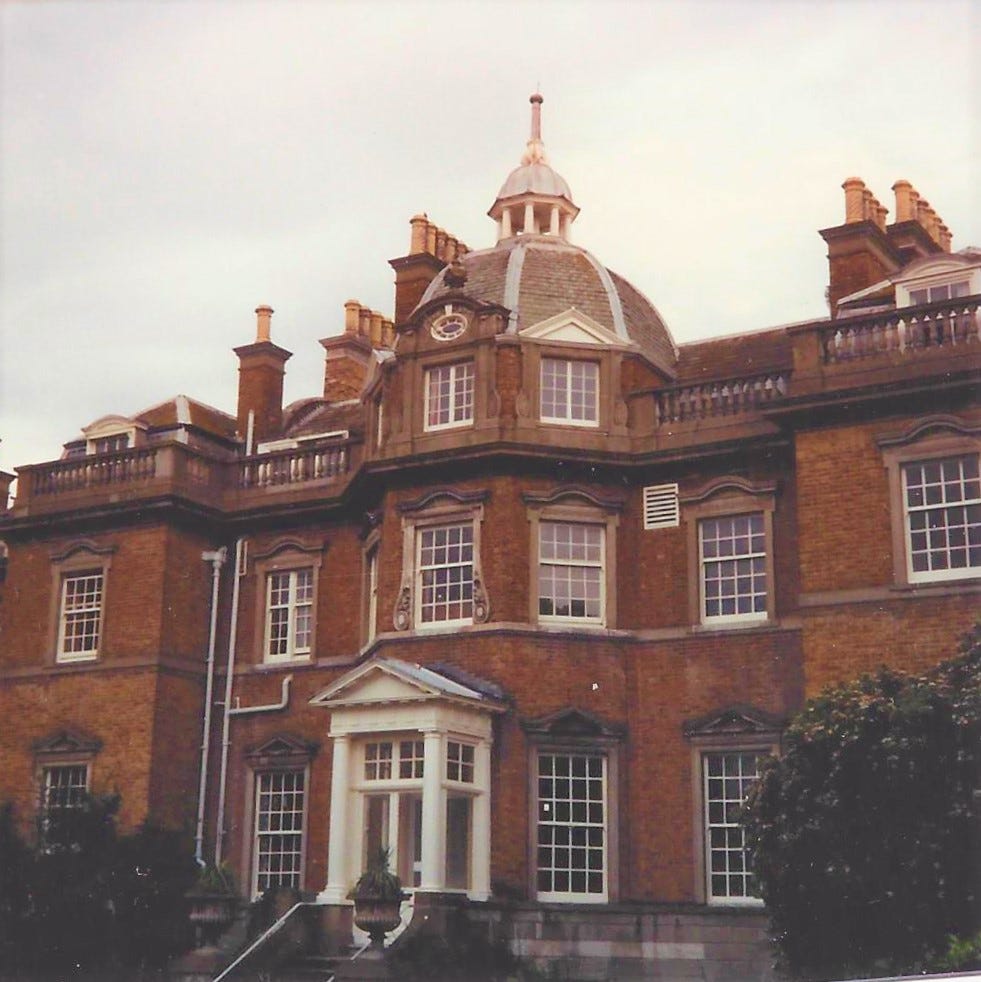
Lesson #7: Expect your travel companions to get onto your nerves sooner or later (and vice versa), and Lesson #8: Remember you’re not in Kansas anymore
The big destination on the third day of our road rally was Hampton Court Palace. As usual, we managed to get ourselves to the general vicinity of our destination, only to be tripped up by the ubiquitous roundabouts.
By the time we made our way to a large parking area presumed to be close to the palace, we were both mad and arguing, so much so that after we parked, both of us slammed our car doors, happy to separate and start walking in different directions in search of the palace.
After 10 minutes of walking, I was thrilled to see a sign for Hampton Court House. Finally. It looked quite grand, certainly on the larger side compared to the old-house museums and mansions we were used to visiting in the States. I climbed the steps, rang the bell, and awaited a guide. Too bad my husband was going to miss it.
Imagine my surprise–or even better, imagine the person answering the bell’s surprise–when I said I was there to tour Hampton Court Palace. I was told that this was not the palace. The person whose day I had just made explained that the palace was across the road, a few minutes’ walk away. But by then, I was so frustrated and discouraged that I picked up what was left of my dignity and walked back to the car.
Not long after, my husband returned. On seeing me, he asked, “Where the hell were you?” to which I responded, “Where the hell were you?” since I had no interest in revealing that I had scored the lead role in a story about a dumb American tourist. Even worse, he answered my query with, “I was at the palace.” It turned out that the palace was hard to miss if you walked in the correct direction.
It seemed a shame to have come that far and, in the end, not go inside the actual palace. As a peace offering, I walked my husband past Hampton Court House. Humbling myself helped lighten the mood, especially since my husband got to wonder aloud, “How did the two Waste Management trash cans in front of the house not tip you off that this wasn’t the palace?”
Within minutes, I fully appreciated how ridiculous my case of mistaken identity had been. Hampton Court Palace was in fact two whole palaces—a Tudor one and a Georgian one side by side, complemented by a maze and 750 acres of gardens.
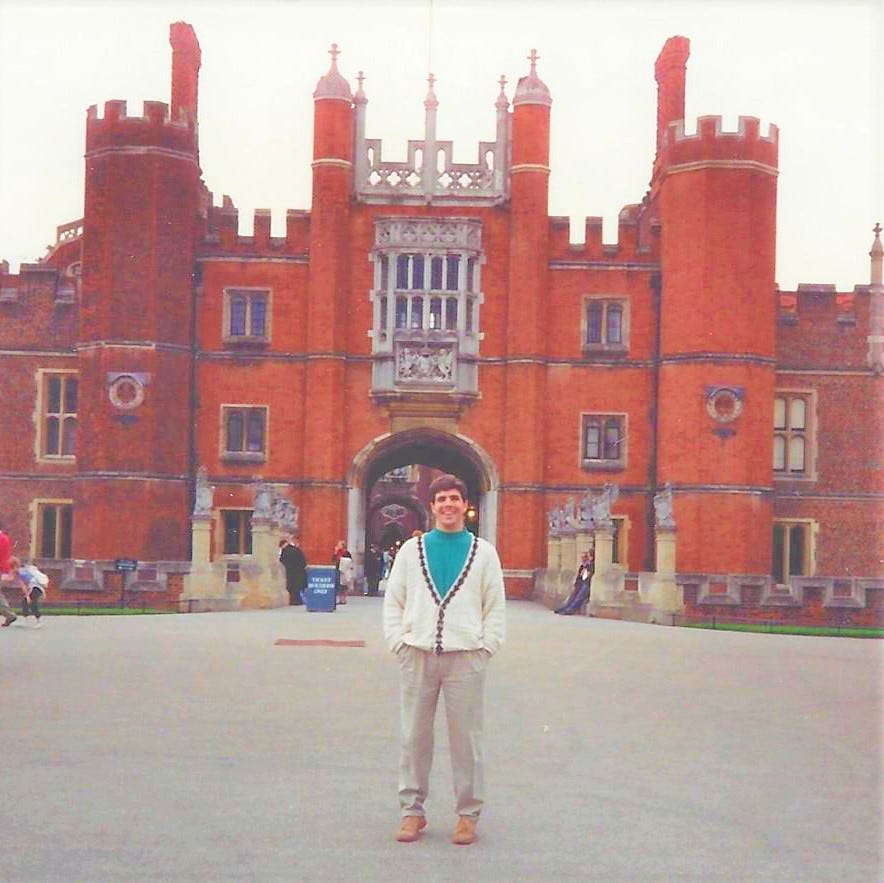
The palace tour was fascinating since it featured an exhibit on how they’d just rebuilt an entire portion of the palace after a devastating fire. By the time we left, we’d regained our sense of humor.
If you’ve never been to Britain, be warned–nearly all buildings look quaint and historic, even if they are of no particular importance. If you’ve never been outside the U.S., recognize that you must adjust your frame of reference.
Also, be prepared that, no matter how much you love your travel companion and generally enjoy their company, you may occasionally require some time apart, especially if you are tired and maybe a little worn out by the trials and tribulations that come with traveling. So take a breather when necessary.
Lesson #9: Research, research, and research some more before you go
Thanks to the frequent flyer miles I racked up on my business trips, we returned to Europe the following year. Since I now understood how important it was to plot a more realistic itinerary and have better navigational information, I bought several city and country maps.
Like General Schwarzkopf plotting the Gulf War, for weeks before we left, I spent hours charting detailed routes of how we’d get from one place to another. The planning paid off. Though we traveled hundreds of miles–from Munich through Bavaria, then on to Salzburg and Vienna, and down into Venice, Florence, and Rome–we rarely got lost.
Whether it’s old-school guidebooks, TripAdvisor, or other online travel sites, it’s easy to find plenty of information about your destination that you wouldn’t otherwise know, along with tips and hacks that may hold the key to making your experience in your destination much less hassle and much more enjoyable.
Learning about your destination in advance helps you appreciate the significance of those incredible sights you will see. Plus, anticipating the trip enhances your enjoyment before you even leave home.
I wish you a bon voyage!

